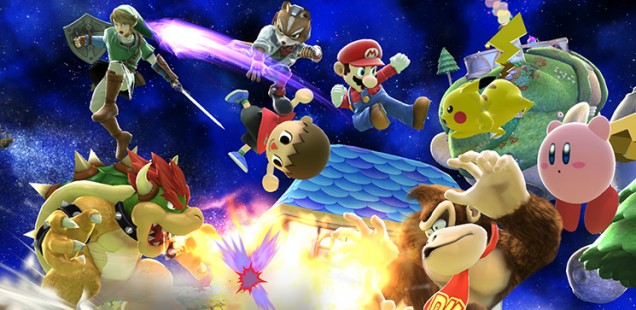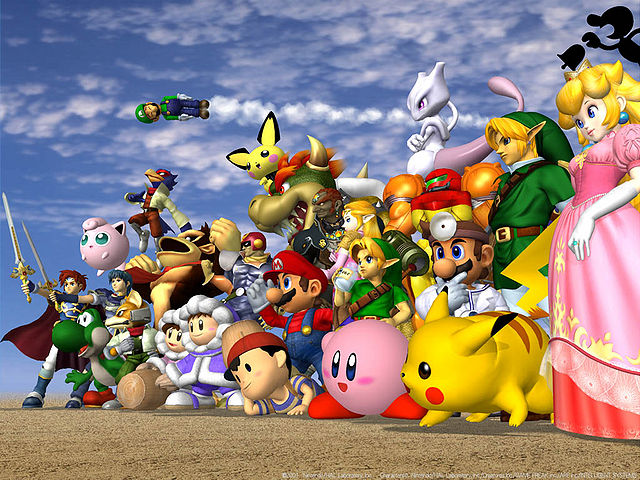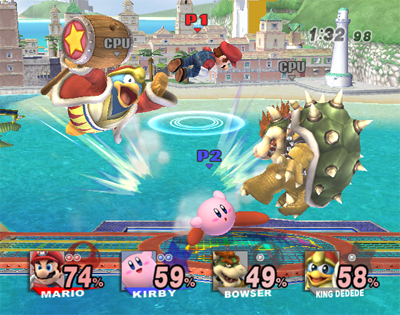
Full Disclosure: Super Smash Bros.
Mark Filipowich admits to his biases.
Come 1996 I had to choose between the Sony Playstation and the Nintendo 64. I was happy with my SNES and Nintendo’s branding department had captured my nine-year old heart. Nintendo was all bright colors, magic spells and mobility. There were cloud islands in Super Mario World that would take decades to discover and tools in A Link to the Past that I exhausted myself trying to unearth. Then again, I lived a small town, I had anger problems and it wasn’t often in school that I got to join in any reindeer games. Four controllers sounded neat, but I’d probably have a hard time getting that many people to come over to use them. No, better go for the Playstation: the solitary console, the thinking preteen’s console.
I shouldn’t overstate the importance of this choice. It was just a choice, but like any it had consequences. One of the consequences was that all those fun colors and the jolly hopping from platform to platform had to wait a few years before my dad could find work again and I could learn to control my temper better. Oh, I know now that my loyalty to Nintendo was bought with cheap plastic toys and bright flickering lights, but just try to think about Mario without smiling. If you can it’s your loss. Anyway, one of the things I lost out on in my ponderous JRPGs and demanding fighting games was the first Super Smash Bros.
I remember seeing commercials for it in 1999. A cumbersomely costumed Yoshi, Mario and Pikachu wail on each other in a field while sparks of hectic play splice in between. What a mess. There was no way it could work. There was no way it had the technical finesse of Tekken 3 or Street Fighter 3. Nope, I had evolved past that. A cousin of mine had a Nintendo 64 and at some family event or other I’d been swept up in a controller swapping contest with a room full of distant relatives. Diddy Kong Racing felt like controlling a brick in a roller skate down a hill and Goldeneye operates on Mad Max might-makes-right, winner-take-all bullshit that would eventually launch me into a tantrum. Under those circumstances, fine, I’ll play Super Smash Bros.
What a disaster of a game! It’s barely possible to keep track of yourself in all that chaos. The second you get your footing, someone snags a hammer and starts hovering toward you. Or you’re trapped in fire flower purgatory, drinking in damage while your opponent keeps you prone against a wall. This was not the studious justice of Tekken, where buttonmashing beats the novice but the master beats all, nor was it the judicious menu-selection of Dragon Quest, where the right balance of strategy and grinding can vanquish any foe. This was the flashing colors and innocent fun of Super Mario World. The goal was to stay on the platform and avoid the things that remove you from the platform. Super Smash Bros. demands movement, either toward the good things or away from the bad things, and luck. You can do everything right and quixotically wander off a cliff at your strongest or do everything wrong and get rewarded with a heart container or a Bob-omb just when you need it. Just stay on the platform and see what happens.
More than that, Super Smash Bros. is a social experience. I remember as a teenager flinging my controller at Tekken Tag Tournament and my mom telling me to calm down: she asked me if I wanted to be a loser all my life. I didn’t know how to respond. Weird that I remember that. I remember the injustice of losing in Dragonball Z: Budokai 2 as my expert Vegeta against a friend’s novice Dabura and sulking in the cold room until he went home.
There was no room in Super Smash Bros. for temper tantrums though. If someone kept getting pokeballs it was because they stayed on the platform long enough to get lucky. Maybe next time I’ll get lucky. How about another round? When Melee came out, it perfected what Super Smash Bros. started. It came out just as I was starting to figure myself out and when I was just learning to keep friends around. I think I still give people a bad first impression, but I’ve learned a lot in fifteen years. I don’t think that self-actualization ever ends, but I’m much more comfortable with the way things are and I’ve learned about myself. Super Smash Bros. has nothing to do with that and it’d be trite to say that it did, but Super Smash Bros. was around when I started to figure myself out and it was around when I started developing friendships.
The friends I have now were around for Melee, and it’s had enough of a lasting impact in general that it’s an icebreaker for co-workers who find themselves the odd-man out at a birthday party. It’s a group activity for those of us of equal skill and if things ever get lopsided there’s always an all bob-bomb match, or a team battle, or an everybody is DK match. Super Smash Bros. stops being about the contents of the game and focus shifts to its context, about the people outside the screen. Stay on the platforms as long as you can and if you step on a landmine it’s no big deal; maybe next time you’ll get lucky. How about another match?
Brawl pushed the chaos even further, and while I remain partial to Melee, Brawl has the same spirit as its predecessors. Some time ago I was talking to a friend a few years younger than me, and they told me about how it caught them at just the right time, about how Melee just doesn’t feel right even though, functionally, it works just fine. I think that speaks to the personalization of this silly, flashy cartoon competition, where friends come together to balance on platforms while they sling chaos at one another. For me, the more refined, the more balanced Super Smash Bros. gets, the less amusing it is. And yet, here is a game that can be played in professional tournaments. It’s a game that adapts to the people playing it. It doesn’t have rules so much as it has options for rules, and that’s why I think it’s possible to take an essence that has barely changed since its inception and use that to make an evening out of with old friends or new friends. Even if that is a little trite I still come back to it and admire it.
So here we are, a decade after Super Smash Bros. I’ve changed and the river has changed. But Super Smash Bros. is the same even if the scope is bigger. Super Smash Bros. is still there for a long weekend between old friends or a way to break awkward silences between new ones: it never demands that it be played right, it’s only ever there just to be played. When time permits, how about another match?
Now on to the review:
Super Smash Bros. for the Wii U or the 3DS might be your favorite in the series but even if it isn’t, it’s probably close enough.
Mark Filipowich is the co-coordinator of the Blogs of the Round Table feature at Critical Distance and the curator for Good Games Writing. His worked has appeared in PopMatters, The Border House, The Ontological Geek and many other fine virtual games locales. He has a sweet blog called bigtallwords and he tweets irregularly and irreverently at @MarkFilipowich.

